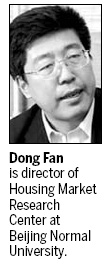-
-
China Daily E-paper
Op-Ed Contributors
Where's the big real estate bubble?
By Dong Fan (China Daily)
Updated: 2010-05-17 09:02
 |
Large Medium Small |

There is no real estate bubble in China. Rising property prices reflect the basic law of economics. Different from the supply-demand relationship of ordinary commodities, supply in the real estate sector is always subject to strict controls in terms of urban planning, land supply, building and planning targets, while demand can at most be influenced by fiscal and monetary policies.
The demand for housing, a special commodity without substitute, couldn't be transferred because of rising prices. The demand in the realty sector is experiencing straight expansion because of the increase in population and rising need for houses. Hence, rising housing prices reflect a kind of law. Prices drop only when a country encounters some special situations such as wars, plague outbreak, devastating earthquakes, special political developments, economic recession, strict but misleading regulations and tax adjustments.
Apart from being subjected to the basic law of economics, real estate prices are influenced by a range of conditions endemic to China. These include a huge population and limited land, acceleration in urbanization, high-paced economic growth, widening gap between urban and rural residents and diminution of family size, as well as the ongoing reform in residential units' regulations, financial system, social welfare network, urban-rural stratum consciousness and the strengthened intention of buying on debt. All these factors strain the real estate's supply-demand relation.
"Property bubbles" refer to a situation in which rising land and housing prices, as a result of speculation, reach unsustainable levels relative to people's incomes and other economic elements. Thus scholars and economists who believe there is a big bubble in China's real estate market are wrong. Under a planned economy, the authorities kept the housing prices low through administrative measures. But after China embraced market economy, housing prices are supposed to jump up like a spring that had been depressed forcibly.
Some people argue that because of the high housing prices the price-to-income ratio in major cities is much higher than the international standard and beyond ordinary people's affordability levels. Hence, "the property bubble is very serious". What they don't know is that the scholar who first came to this conclusion has already denied it.
In foreign countries, rural houses are included in the list of commercial housing, while in China a large number of low-cost houses are not considered part of commercial housing. Overseas, land supply is competitive under private ownership, while in China governments at all levels monopolize it within their jurisdiction. There are many small townships in foreign countries. In contrast, China has a lot of large and medium-sized cities. And we know that the size and nature of cities influence housing prices greatly. Since so many factors are different at home from those overseas, the price-to-income ratio cannot reflect the real situation.
Some scholars believe that because the rent-to-price ratio in China is much above the global standard (1/200 in mature market economies) there is a housing bubble in the country. They say so because they ignore the difference in calculating housing prices in and outside China, and the impact on the ratio caused by the differences in residential culture, land ownership systems, macro-control measures. Chinese people, traditionally, have longed to own a house and are reluctant to rent one. This inevitably boosts the housing demand and increases property prices. And since houses are rented mainly by low-income groups, the rates cannot be high. So a person who owns more than one house would be reluctant to rent it out, instead he/she would want sell it off at a high profit.
Apart from trying to increase housing supply, the government's newly issued measures are aimed at controlling demand. And the government will try to meet its goals through its administrative accountability system. As a result, the supply-demand relation will change significantly in the short term.
As far as demand is concerned, some homebuyers will adopt a wait-and-see approach for fear of later policy (tax and interest rate) changes, others may be worried over the rising transaction costs, and still others may defer their purchase plans till the "bubble bursts". Such panic sentiment would lead to a decline in demand.
For supply, "real estate speculators" will undersell the houses they have "hoarded". Though the number of such houses is not big, it could greatly influence the decision of property developers if the media "sensationalize" it. Fearing devaluation of their assets, some people who own more than one housing unit, too, would undersell their property. And some developers could cut prices to sell their housing units.
A larger number of incremental units are expected to flood the housing market after six months. With supply rising and demand falling, housing prices may begin to fall and certain cities could experience remarkable price volatility.
The worry, though, is not fluctuations in housing prices but how the authorities will address the problems emerging in the macro-control process. The financial market will be impacted, threatening credit quality. Part of the credit funds would be forced to flow into areas with excessive capacity, high-quality mortgage loans would face limitations, and if housing prices plunge by 20 or 30 percent, contract violation cases will increase markedly.
When housing prices plunge, demands usually hibernate and buying is suspended, which in turn will intensify the overcapacity of industries relying on property development. So the end of 2010 and beginning of 2011 may see a sluggish market like what happened in late 2008 and early 2009.
(China Daily 05/17/2010 page9)









